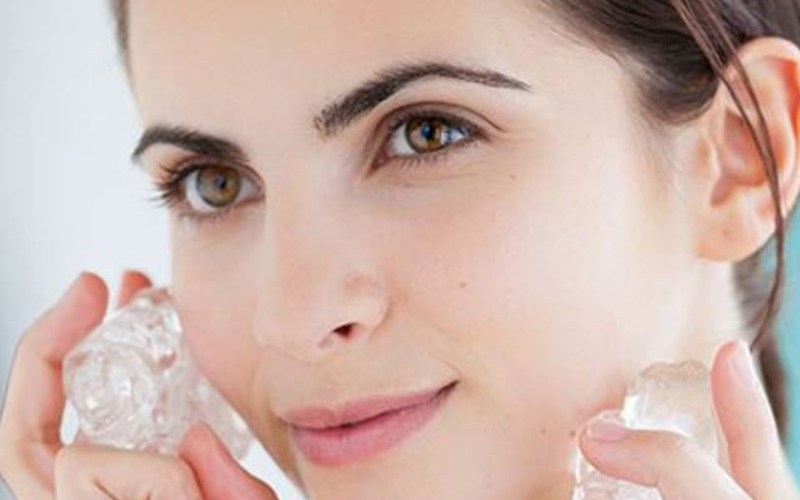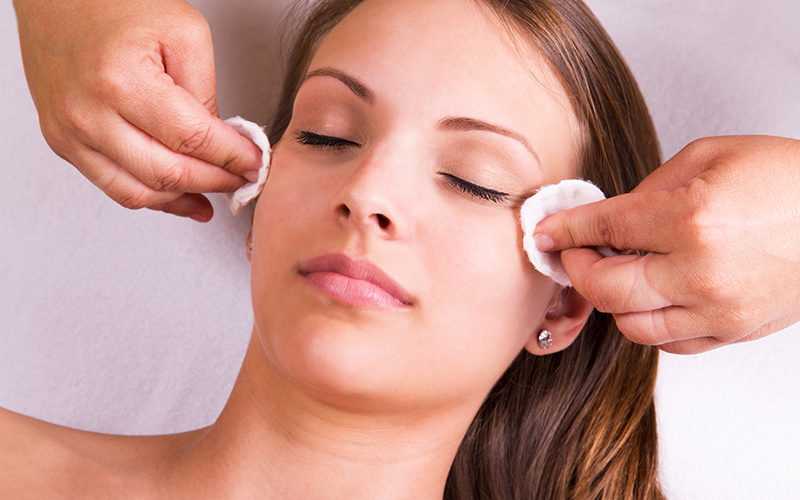Caring for sensitive skin during this winter

Being the main organ of our body, the skin needs special care according to the time of year and especially when it comes to sensitive skin that is often irritated by the effect of climate that also makes them more susceptible to alterations that can be prevented.
As a first advice, it is necessary to avoid very aggressive skin cleansing products. It is advisable to use make-up removing milks , leaving aside tonics, exfoliating products or products containing alcohol.
The use of creams with retinal should be spaced during the winter especially in sensitive skins and always use hypoallergenic products, not abusing deep cleanings or any type of aggressive procedure for the skin, keeping it well hydrated.
Also, during the winter and sudden changes in temperature cause harmful effects on sensitive skin, including heated environments, wind and environmental pollution, adding to all this a deficient diet, all elements that contribute to the skin suffering from dryness, redness and even peeling.
It is necessary to take care of all the skin from the face to hands, elbows and knees that also dehydrate during the winter, using regularly moisturizing, regenerating and nourishing masks and exfoliating the skin only every 20 days to eliminate dead cells.
Use creams with sunscreen is essential in all skin types and especially in sensitive since the sun affects it despite being winter, it is advisable to opt for products with protection factor 15 or 20 for normal skin and more protection for sensitive skin.
In the case of sensitive skin and also with a tendency to dry out easily hydration should be done at least twice a day, following a routine that begins with morning cleaning, hydration, cleaning at night and nutrition.
The use of soap should also be controlled so as not to dry sensitive skin and always use products with pH balanced or neutral and in case of dry skin use a soap that contains some moisturizer or emollient in its formula.
The daily bath should be done with warm water and not subject the body to sudden changes in temperature, applying moisturizing cream on the entire body, in addition to using cream makeup that helps the overall protection of the skin.
Tips for caring for sensitive skin

- It is essential to maintain good hydration to improve the appearance of the skin and protect it from external aggression. It is advisable to moisturize the skin of the face in the morning and at night, before sleeping, and the body after each shower.
- Protect from the sun Sun rays are among the main responsible for sensitive skin, so it is important to use creams that have SPF protection, even in winter. And especially if you practice snow sports.
- Use beauty products and cosmetics adapted to sensitive skin , without perfumes, without alcohol, without preservatives … that respect the natural balance of the skin. More and more cosmetic firms are launching specific lines for sensitive skin. ( In the gallery you can see a selection of treatments for sensitive skin ).
- Maintain a daily cleaning routine . Cleaning on sensitive skin is essential, but avoid rubbing, as aggressive movements irritate the skin. For example, exfoliation is only recommended once a week. And you have to be especially careful with cleaning products that are used, since sensitive skin reacts badly to the use of certain soaps.
- Use warm water and reduce shower time . Hot water dehydrates the skin, so it is advisable, as far as possible, to use warm water to shower and cool, to wash your face. The prolonged baths are also not convenient, it reduces the time of your shower.
- Flee from stress and fatigue . Sensitive skin reacts to situations of stress and fatigue with outbreaks and rashes, so our advice is that if your skin is sensitive, avoid these situations, practicing relaxation exercises.
- Avoid extreme environmental situations . The cold is a great enemy of sensitive skin, so in winter you have to take care and in the case of sports such as skiing, it is necessary to moisturize and protect the skin often.
- Environmental dryness is also detrimental to sensitive skin. That’s why it’s important to maintain good hydration, both with creams and by drinking water. Also in winter, to counteract the environmental dryness caused by heating, it is advisable to use humidifiers.
- Avoid spicy foods and exciting products that can also worsen the symptoms of sensitive skin.
Types of cutaneous sensitivity

- The sensibility can be natural, from birth , when the skin is fine, dry, reddens easily and can suffer diseases such as coupe rose, dermatitis … you should be treated with the help of a dermatologist.
- The sensibility can also be reactive : when the skin reacts reddening in the cold, the sun, the wind, an aesthetic treatment such as peeling, or inadequate hygiene care.
- Sensibility may be occasional : when it reacts at specific moments such as hormonal changes, stress, fatigue, poor diet …
How to care for sensitive skin

What are the symptoms to know if you have sensitive skin? How can you restore comfort and finally finish redness? What makes it worse? What is the best makeup for sensitive skin? If you have doubts about what are the best care and habits for sensitive skin, we answer each and every one of the most common questions.
What is the different between sensitive , allergic and atop skin?
Sometimes it is difficult to diagnose if it is one type of skin or another, because many of the symptoms are similar.
Sensitive skin does not have to be allergic. It is a more vulnerable type of skin that reacts exaggeratedly to certain external stimuli (heat, cold, sudden changes in temperature, pollution, skin contact with very hard water, cosmetics, metals or some tissues) and internal (eating things spicy, consume alcohol). This hyper-reactivity acts on the nerve endings of the skin causing tension, itching, heat, rashes, scaling, burning or redness. They are also known as reactive or intolerant skins . And although many people associate skin sensitive to dry skin, we must bear in mind that there are also sensitive skins that are fat.
In the case of topic skin, it is a chronic disease. It is a dermatitis (inflammation of the skin) and is mainly characterized by dryness. It is a skin with little water and fat, which leads to scaling and irritation and causes annoying symptoms such as itching that becomes exasperating. It is not contagious, but in the last 30 years its presence has doubled due to environmental factors and the increase of irritant products. When the disease is at its maximum expression we speak of outbreaks, which appear at the most unexpected moments.
In the allergic skins the immune system is involved. The skin reacts with an inflammatory process to a substance that most people tolerate well, but in some cases the body recognizes as foreign (antigen). They can be allergies to pollen, to certain plants, to some foods (eggs, seafood, nuts) or to sun exposure. It is the dermatologist who, through certain medical tests, determines if there is any type of allergy.
What is the best cleaning for sensitive skin?
To keep the redness and scaling at bay, it is preferable to remove make-up with a cleanser that is removed without water. Although if you prefer rinse cleansers, you can use a dermatological bread or syndicate, a kind of soap bar specific for sensitive skin that, precisely, does not contain soap so as not to irritate the skin. If Michelle water is used, no tonic will be needed later. But if a cream or cleansing milk is used , it is advisable to use an alcohol-free facial tonic to restore the natural pH to the skin or, much better, replace it with thermal water sprays , which calm, decongestant and hydrate.
If you have sensitive eyes. There are specific make-up removers that specify in their packaging that they are suitable for sensitive skin (two-phase or with thermal water) and that remove the makeup without rubbing the eye. You can even have sterile single-dose pharmacies that respect the fragility of the eyelashes or eyelids.
The peels. Sensitive skin can also be done deep cleansings. The only thing that must be taken into account is to use exfoliates with very soft micro particles (no salts, sugars or large granules) and only once or twice a month, without rubbing hard.
What cream and product are best for sensitive skin?

A moisturizer that is protective and soothing . In case the skin is dry or mature, it is also advisable to apply at night a restorative and nourishing cream that reinforces the cohesion of the epidermis cells.
It is best to use only specific cosmetics for sensitive skin. They are formulated with few ingredients and of great purity. The simpler the formula, the lower the risk of irritation and the fact that some assets react to each other.
Airless packaging. Or what is the same, containers that prevent air from entering and oxidizing the product. So better dosing or tube type containers than jars.
Discard “problematic” components . Like lanolin, alkaline substances (ammonia), preservatives dyes and perfumes. Check that the label is hypoallergenic.
Choose fluid and light textures. They are more recommended than creams that are too unctuous or “tapping” the skin.
Do not change frequently the product and brand. You will avoid the risk of discovering new irritants. If a cream works well, you can use it for months or years. And if you need a denser formula for winter, you can choose another product from the same firm.
A couple of times a week. Or when you feel tightness or itching is recommended to use a soothing mask. Thermal water, on the other hand, is an excellent wild card that can be used as many times as desired.
The sunscreen, essential. It is for all skin types, but if it is sensitive, better than the protector is full screen or with 50+ sunscreen factor and with physical and non-chemical filters. Physical filters, with a formulation based on minerals, are better tolerated by very white and sensitive skins.
It also protects the hands and lips. Other parts of the body are very exposed and in the case of sensitive skin, they appreciate extra pampering. Include hand creams and moisturizing lip balms to prevent them from drying out and cracking.
Finally, drink enough water daily to keep the skin hydrated and consume foods that provide the body with vitamin C. Normal skin will react in a way that increases sebaceous secretion, this being more viscous, which makes it a natural protection of the skin against lower temperatures. However, the more sensitive skin will notice this change more. Our collaborator Merit ell Marti points out that sensitive skin includes more reactive skin, dry and extremely dry skin, atopic, with eczema, skin with curvaceous, dehydrated skin, skin with seborrhea dermatitis, allergic skin or with psoriasis.




